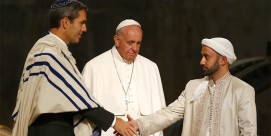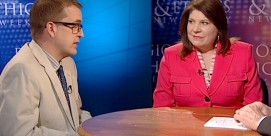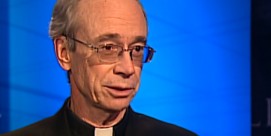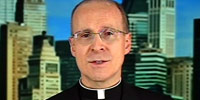In This Episode << SLIDE LEFT TO SEE ADDITIONAL SEGMENTS
Sister Carolyn Farrell Extended Interview
Read more of Judy Valente’s interview with Sister Carolyn Farrell:
Q: What impact do you think the scandals are having on the Church right now?
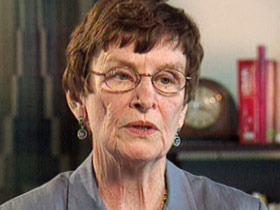
A: People, in general, are really shocked, perhaps dismayed at the leadership within the Church. The Church as a hierarchical model has not been the best witness today of open and honest communication. People are trying to sort that out: What does that mean? What should we do? How will the hierarchy behave in the future? Those are all key questions that we’re all struggling with today.
Q: Is the problem worse than it appears? Do you think there’s more bad news to come?
A: I’m not sure whether there’s more bad news to come, but in an arena of secrecy, we don’t know. Given the past 15 or 20 years, there could be a number of cases that we don’t know about, and I have a feeling that we will be hearing more. The number, I’m not sure, but if there’s secrecy, then there’s bound to be more going on.
Q: Are you convinced that the Vatican realizes the depth of the problem?
A: I’m not sure if it does or it doesn’t. The meeting was held in Rome, and cardinals went to attend, and once again, we’re talking about a hierarchical model, a closed system. Men came to discuss; a certain percentage of the information was shared publicly, and other parts of the conversation were not. It’s hard to know what the Vatican is picking up on. I think the publicity has been such that the impact here in the United States, and actually around the world, is important for them to notice, and I have a feeling that they have noticed it.
Q: Is it too early to assess the long-term impact of the scandals?
A: There might be some good news out of the scandals. What it has highlighted is the secrecy, the top-down hierarchy, and [it’s] probably turning the laity more on — they’re becoming more active. It’s like what we heard from Vatican II: the Church is the people of God, and we are the Church. I have a feeling that laypeople will continue to stay in there and be active. Time will tell, but I think that’s part of it. We’re talking about a structure; it isn’t the Church. Structure is good to hold something together, but when a structure becomes oppressive, then you need to do something about the structure.
Q: What will it take for the Church to regain the trust of the people?
A: The trust will have to be built up over time, and people in the Church will have to watch and listen to see the direction that the leaders of the Church will take, to see how laypeople are involved in that process. You have to build trust, and in a situation like this, people have lost trust in the men they identified as leaders. What will it take to bring that trust back? You have to draw the people into the process to get them to buy into the future of the Catholic Church.
Q: How do you think change will happen? Will it begin at the parish level and percolate up?
A: Well, when you hear what’s going on now, whether or not people choose to give money or committees are formed, a number of laypeople are becoming involved at the local level. Certain activist committees are speaking out. If they are heard or if it makes a difference is another story. Things will change, but it will take some doing, and only time will tell.
Q: What policies do you see changing?
A: After Vatican II, we looked to a better spirit of collegiality, subsidiarity — dealing with issues at the local level that could be handled by the local level, whether it was the bishop and the bishop was in charge of his diocese, or at the parish level. I’d like to see a return to more of that kind of an attitude — a more collaborative, inclusive spirit, not just what the bishop says. Let’s have some input. I think we need women’s voices at the table. Women have not been part of the conversation, and that’s a critical piece that many women and men believe should happen. How it happens is another story. It could be at the committee level, or it could be a significant change in women holding significant roles in the Church.
Q: Are there signs, do you think, that the withholding of contributions by parishioners is [growing to] serious proportions?
A: I’m not sure that people are really holding back on money. Some will. I know that we’ve often said that women should not give to the Church, and see what difference it would make, but people don’t necessarily get into that. Fund raising, though, may be very difficult on major issues. Maybe the local parish will do well in contributions. It will probably depend on the local level. If there’s a good spirit in a parish and people feel like they’re being heard and they’re part of the community, they’ll give. However, if they feel left out and hurt, they won’t. Whether or not people should treat money that way, I’m not sure is right, but it certainly is the American way of doing things.
Q: Do you think it’s right to withhold contributions as a protest?
A: Not necessarily, because the Church does good work and you’re penalizing the work that the Church does by withholding funds. However, withholding funds draws attention to what’s going on, like a typical boycott. It [makes] a difference. When you’re talking about charitable needs or running institutions that do good for others, it seems like you’re almost cutting off your nose to spite your face.
Q: The Vatican suggested, at one point, that this is an American problem, yet we know that there have been similar scandals in other countries. Do you think bishops in other countries are simply looking the other way?
A: From what I’ve heard from a friend back from Ireland, it’s on the front pages. I remember reading here about the incident of the Polish bishop, so I have a feeling, from what I’ve read and heard, that it’s not just in the United States but rather a global concern.
Q: Do you think the Vatican views the American situation with some suspicion because they think this is just a means to get other issues on the agenda, like women’s ordination and a married priesthood?
A: I’m not sure how the Vatican looks at those reasons for what’s going on today. Both causes are worth consideration. We’ve talked about women’s ordination to the point we’ve been told that we can’t talk about women’s ordination, yet we continue to talk about it. It’s an issue that will continue to surface and surface and surface, and perhaps someday women will be ordained. The same thing is true about celibacy. We’ve talked about it and talked about it, and not much has happened, but this kind of a discussion will bring it to the floor one more time. If you go back to the early days of a Church, neither issue is tied to Jesus’ message; Jesus has had an inclusive community with him of men and women, including married men and women who were with him serving — for instance, Mary Magdalene. It’s time that the Church paid attention to the Scripture that it supports.
Q: You bring up an interesting point, that you’re not supposed to discuss these issues, yet people keep discussing them. What does that mean?
A: It means that issues are alive and well. It means that people are concerned about these issues. People believe in freedom of conscience, and that’s very important. Freedom of conscience also comes out of Vatican II. It’s an informed conscience; you read, study, talk, pray, and you speak. I think that supports the conversations going on today.
Q: Realistically, can the reforms being demanded by many liberal Catholics actually take place — for example, a married priesthood — or are they things that doctrinally the Church just cannot do?
A: I can’t speak as a theologian, but the Church can look at these issues. Other changes have taken place through history. [The Church] had a biblical commission [studying] the Scripture regarding women’s ordination, and the Scripture does not say either way whether women can or cannot be ordained. So change could take place. It’s like the leadership, and it’s also working with the signs of the time as the Spirit lives today. The Spirit didn’t stop working at the time of Jesus. The Spirit is still alive today. So I think that’s another piece that needs to be considered.
Q: When the bishops go to Dallas, what do you think they have to do to convince the laity that there will be some changes?
A: In a situation that’s hierarchical, it’s going to take them some time to convince the laity that they’re serious about change and to be able to work their own system. To draw people into committee work, into conversation, to the table, to ask for input and act on it will probably [be] the best testimony that they’re serious about what they’re doing. However, it won’t happen overnight. When people are in authority, they’re in charge; we have a great tradition of having bishops in charge and [laity] not having a lot of input. We’re going to have to face that issue, too, as we move into the future.
Q: Do you think the cardinals blew it when they came back from Rome, as one person put it, by not really having a very clear response?
A: Many people were disappointed in what the cardinals said, or the lack of what they said. I’m not sure what prompted the cardinals to make that kind of a statement or to hold back, and that, once again, leaves people in a quandary: What are they really saying? What do they really mean? Are they taking this seriously? Where do we fit in the conversation? When you’re talking about trust, you have to have two-way communication to build that trust.
Q: So would you be looking for a clear response coming out of Dallas?
A: A clearer response, I trust, will come out of Dallas — more conversation about the need for open and honest communication. I think that’s where it’s at. The heart of the matter is the hierarchical approach to these issues: the secrecy issue, the “I’m in charge” issue, and how they work out of that. It’s the system that’s been going on for a long time. Pope John Paul II has reinforced that over the past 20-plus years. It’s going to be a challenge of a task to suddenly be open and honest out there with information.
Q: Do you think there’s a doctrinal basis for changing the celibate priesthood, or is that something that cannot be changed?
A: The issue of celibacy has not been around since the beginning of the Church, when we talk about Jesus and the apostles. Peter had a mother-in-law; Peter was married. That tradition continued until about the Middle Ages, when it was a Church law that changed the regulation and you could no longer have married priests. If a law were put into place that you could no longer have married priests, it would seem to me that a law could be put in place that would allow optional celibacy and a married priesthood. That’s simple logic.
Q: What is the likely effect, do you think, on the priesthood of these scandals? Do you think even fewer men will want to become priests?
A: It’s very difficult for the priests, and no doubt for vocations to the priesthood. It’s a small percentage of priests who are in the scandal that we’re talking about today, and the impact probably will be significant for a while; but you need people to serve, and how that’s going to play out, I don’t know. It’s a critical time in the Church right now. It’s a time, hopefully, for new beginnings, but it’s that kind of situation where everything comes down before it goes up, and we’re just living through that moment in time.
Q: Is this a key moment for the laity?
A: I think so. After Vatican II, the laity were really instructed to become involved. It was a time of the Church of the laity, but shortly thereafter, we had Pope John Paul II come along, and he didn’t quite see it that way. Changes shifted back to the hierarchical model, and the laypeople, in one sense, had less to say. However, they’re active at the local level and in a lot of ways, and when you’re out of priests suddenly, you can have a layman or a laywoman, or religious woman, take a job that previously was only held by a priest, which is also interesting.
Q: How might this affect the legacy of Pope John Paul II?
A: He’s well known as the traveling pope, and he’s done a great job traveling around the world preaching a social justice message, which is important — how to love your neighbor and get along. I’m always wondering who is doing the work while he’s out traveling around. What he’s leaving for us is a very structured, very tight, very strong, authoritarian, centralized government. Structure is important, but when structure becomes oppressive, it no longer works. His legacy is probably going to be twofold: you will have his being noted as a traveling pope who has spread a message around the globe tirelessly, and also [who] left a bureaucratic system that was just focused on itself and maintaining its own power. Through all of this scandal, the value of the message of the gospel and the value of the Catholic Church will be weakened for a while. My fear is that when the bishops come out and say something that’s really meaningful, that could help to make the world a better place, people are going to say, “Ho hum, so what?” That, to me, is the tragic piece of this whole thing.

